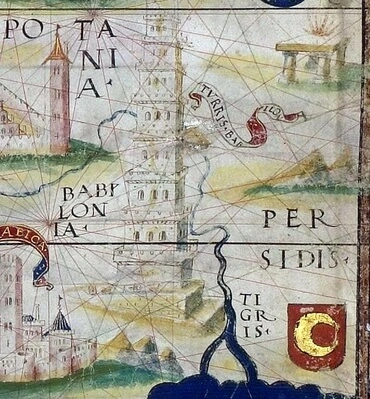1
And the whole earth had one language, and the same words.
2
And it came to pass as they journeyed from the east, that they found a plain in the land of Shinar, and dwelt there.
3
And they said one to another, Come on, let us make bricks, and burn [them] thoroughly. And they had brick for stone, and they had asphalt for mortar.
4
And they said, Come on, let us build ourselves a city and a tower, the top of which [may reach] to the heavens; and let us make ourselves a name, lest we be scattered over the face of the whole earth.
5
And Jehovah came down to see the city and the tower which the children of men built.
6
And Jehovah said, Behold, the people is one, and have all one language; and this have they begun to do. And now will they be hindered in nothing that they meditate doing.
7
Come, let us go down, and there confound their language, that they may not understand one another's speech.
8
And Jehovah scattered them thence over the face of the whole earth. And they left off building the city.
9
Therefore was its name called Babel; because Jehovah there confounded the language of the whole earth. And Jehovah scattered them thence over the face of the whole earth.
10
These are the generations of Shem. Shem was a hundred years old, and begot Arphaxad two years after the flood.
11
And Shem lived after he had begotten Arphaxad five hundred years, and begot sons and daughters.
12
And Arphaxad lived thirty-five years, and begot Shelah.
13
And Arphaxad lived after he had begotten Shelah four hundred and three years, and begot sons and daughters.
14
And Shelah lived thirty years, and begot Eber.
15
And Shelah lived after he had begotten Eber four hundred and three years, and begot sons and daughters.
16
And Eber lived thirty-four years, and begot Peleg.
17
And Eber lived after he had begotten Peleg four hundred and thirty years, and begot sons and daughters.
18
And Peleg lived thirty years, and begot Reu.
19
And Peleg lived after he had begotten Reu two hundred and nine years, and begot sons and daughters.
20
And Reu lived thirty-two years, and begot Serug.
21
And Reu lived after he had begotten Serug two hundred and seven years, and begot sons and daughters.
22
And Serug lived thirty years, and begot Nahor.
23
And Serug lived after he had begotten Nahor two hundred years, and begot sons and daughters.
24
And Nahor lived twenty-nine years, and begot Terah.
25
And Nahor lived after he had begotten Terah a hundred and nineteen years, and begot sons and daughters.
26
And Terah lived seventy years, and begot Abram, Nahor, and Haran.
27
And these are the generations of Terah: Terah begot Abram, Nahor, and Haran; and Haran begot Lot.
28
And Haran died before the face of his father Terah in the land of his nativity at Ur of the Chaldeans.
29
And Abram and Nahor took wives: the name of Abram's wife was Sarai; and the name of Nahor's wife, Milcah, a daughter of Haran, the father of Milcah and the father of Iscah.
30
And Sarai was barren: she had no child.
31
And Terah took Abram his son, and Lot the son of Haran his son's son, and Sarai his daughter-in-law, his son Abram's wife; and they went forth together out of Ur of the Chaldeans, to go into the land of Canaan, and came as far as Haran, and dwelt there.
32
And the days of Terah were two hundred and five years; and Terah died in Haran.







